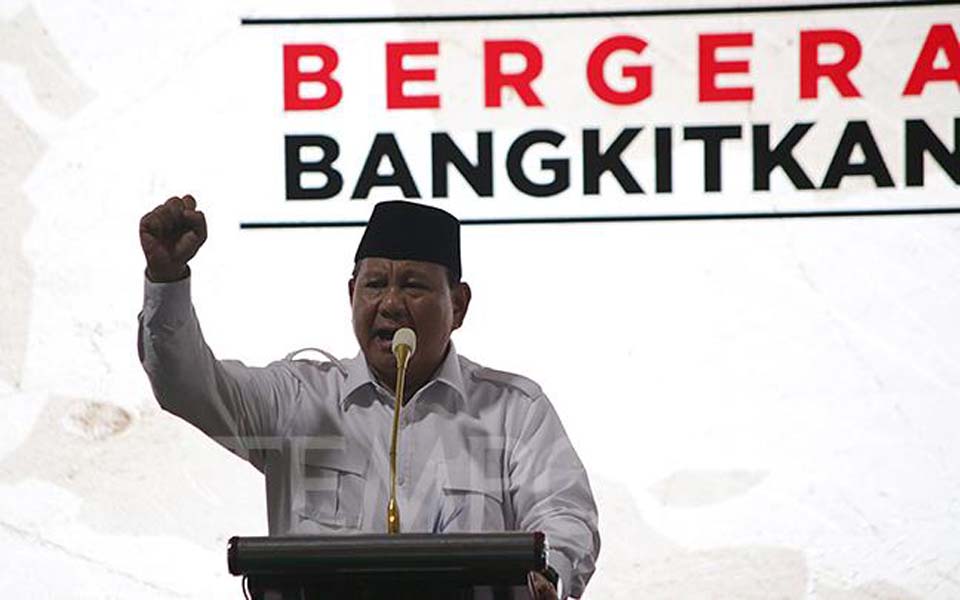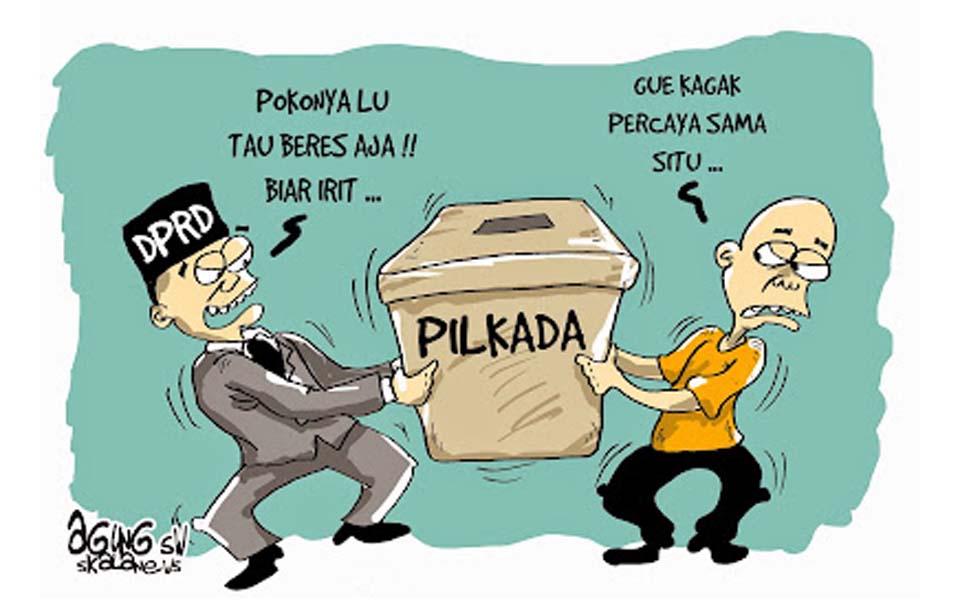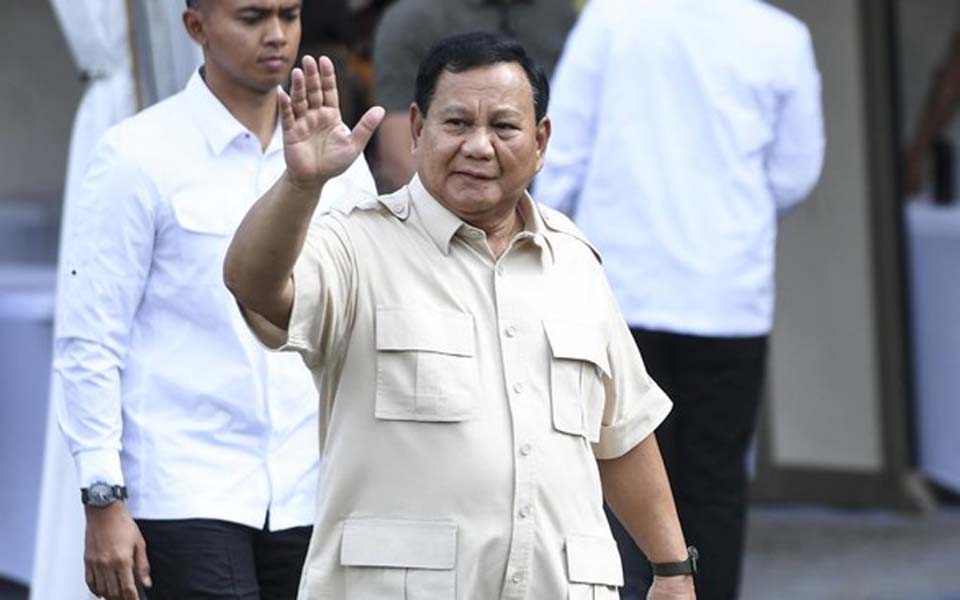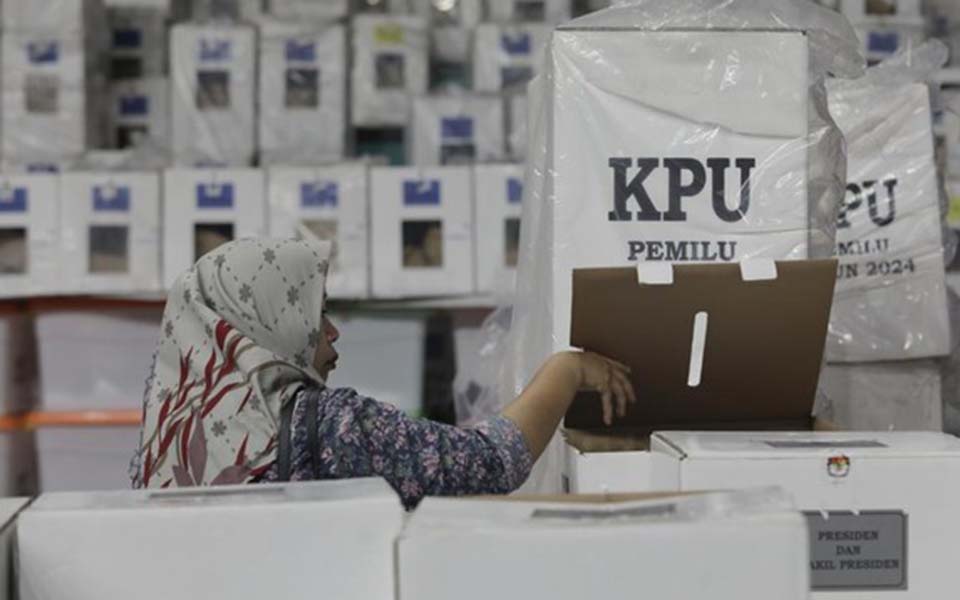“If Jokowi and Prabowo go head to head in 2019, they almost definitely cannot, and should not, repeat the strategies they used in 2014”.
Puthut EA – It is almost certain that Greater Indonesia Movement Party (Gerindra) chairperson Prabowo Subianto will again face off against President Joko “Jokowi” Jokowi in the 2019 presidential election.
But the current political situation is quite different from the first time they ran against each other in 2014.
The precursor to this “hottest of battles” is last year’s Jakarta gubernatorial election which ended with Anies Baswedan defeating incumbent governor Basuki “Ahok” Tjahaja Purnama. The reverberations of this contest are still being felt to this day. The second precursor will be the upcoming simultaneous regional elections.
Because of these “warm ups”, Indonesia’s social conditions have of course become over heated. In such an excessively heated atmosphere, if the Jokowi vs. Prabowo rematch is not held in an astute and engaging manner, there’s a good chance that voters will suffer “dehydration” and psychological fatigue. The political consequence of this could be disastrous: first irrational politics will come to the fore. Or second, voters will become even more apolitical.
Let us look even further ahead. There are several issues that need to be scrutinised. It is almost certain that in terms of campaigns, the two camps will take up the same issues as they did in the 2014 presidential elections and the 2017 Jakarta gubernatorial election.
For supporters in Prabowo’s camp, the issue of religion and Jokowi’s alleged links with the defunct Indonesian Communist Party (PKI) will continue to dominate. The supporters in Jokowi’s camp meanwhile will continue to take up the issue of diversity and human rights.
But, these issues could in fact harm both camps. The religious issue for example, cannot be used to attack Jokowi because unlike Ahok, who was an ethnic Chinese Christian, Jokowi is a Muslim. And not only does he embrace the religion of Islam, he’s known as being a devout Muslim. Trying to corner Jokowi with any kind of religious issue simply will not work.
It has already been demonstrated that the PKI issue can’t be used to stop Jokowi from winning. It was used in 2014 and was a proven failure. It would be idiocy for Prabowo’s supporters to use these two issues again.
Meanwhile if the diversity (kebinekaan) issue is taken up by Jokowi’s supporters it will also be counter-productive because right from the start it can easily be countered. Claims by Jokowi’s supports that he is pro-diversity and pluralist will in fact expose the fact that they are not pluralist and his government is even tending towards authoritarianism (fascism).
This was easy to see in the wake of the Jakarta gubernatorial elections, because while Ahok’s supporters were quick to exploit pluralism and diversity, the policies of the Ahok administration actually showed the opposite, so they lost the majority of the civil society vote.
The human rights issue also can’t be used to attack Prabowo. The simple reason being that during Jokowi first term in office there have been no efforts by the government to bring Prabowo to justice for the human rights violations he was accused of during the 2014 presidential election. So if they repeat this worn out approach, it could instead boomerang back on Jokowi.
The current problem for both camps’ supporters is that they are fat around the middle. This “overweight middle” is susceptible to shifting positions and choices. At the same time they are easily dehydrated and fatigued.
This is very clear from a number of surveys. Why for example is the difference between the number of people who are satisfied with Jokowi’s performance so much higher than his electability? This means that people are satisfied with Jokowi but if there was a better choice they wouldn’t vote for him again.
These survey results cannot of course be applied to Prabowo because he is not in power. What kind of survey tool could test the public’s level of satisfaction with Prabowo performance?
The fluidity and “fat” of voters around the middle cannot be ignored however because there is another statistical fact regarding Prabowo. Several surveys show that people who voted for Prabowo in 2014 are no longer interested in voting for him again. In simple language, for a number of reasons Prabowo tends to be abandoned by his long-term vote base.
It is on this point that both camps have to be careful about what strategy they apply. Meaning that what could eventuate is that the supporters of the two competing camps shrink at both poles and become smaller and more isolated from voters. Especially so if they use the same old jargon and strategies (the issue of religion and the PKI by Prabowo’s supporters and diversity and human rights by Jokowi’s supporters).
This isolation of supporters in the two camps will also automatically “imprison” and isolate Prabowo and Jokowi as well.
Supporters in both camps will become even more isolated if for example Jokowi tries to clear away or silence critical voices in civil society, whether it be in the name of the Palace, political stability or whatever. This is already happening quite a lot. Moreover many among Jokowi’s supporters themselves are embarrassed by this strategy because it will only harm Jokowi. It’s just cheap. As the saying goes, “If you’re going to lick arse, don’t go too far...”.
Lashing out at activists, social figures and the scientific community who are critical of Jokowi is counter-productive. This would be very foolish because in an electoral democracy, criticism is not always the same as voting preferences. Jokowi is criticised by people but they still vote for him. But, if his supporters stifle this democratic mechanism, Jokowi will be abandoned by his critical supporters. Of course this does not automatically mean that the votes of his critical supporters will go to Jokowi’s opponent. But their absense will be a disaster for Jokowi in the same way as it was a disaster for Ahok in the Jakarta election. Perhaps Jokowi’s supporters need to become better acquainted with the temperament of Indonesian civil society, and what the meaning of “critical support” actually is.
There is a similar problem among Prabowo’s supporters. Identity politics is indeed coming to the fore. But, Indonesia is not Jakarta and the 2019 presidential election will not be the same as the 2017 Jakarta elections. If religion is offered up as the main dish, voters will further distance themselves from Prabowo. Especially since there has been a series of incidents that directly link the unhealthiness of religion being used as a political issue in people’s daily lives. Indonesia has grown intellectually and old methods which are repackaged will only create a backlash against their creators.
It is increasingly clear for both camps that applying the wrong strategy has the potential to damage and isolate both Prabowo and Jokowi. Meanwhile the political reality right now is that these are the only two candidates with any real potential to face off against each other in the presidential elections. There is no, or at least not yet, any alternative candidates. And even if there were, the likelihood of their being elected is extremely low.
And the other issue that they should be on guard against is if the public begins to suffer from “political fatigue”. The dust hasn’t even settled yet on the Jakarta gubernatorial elections and the public will soon be faced by simultaneous regional elections in 171 electoral districts followed by simultaneous presidential and legislative elections in 2019.
This fatigue, added to by voter’s alienation from the two competing camps, plus wounds that are increasingly difficult to heal, will force a majority of Indonesian voters into the unhealthy alternatives of becoming either irrational or apolitical.
This has already begun to be apparent from research on social media trends, where people who talk electoral politics are un-friended, un-followed and un-liked. If this kind of thing is not carefully considered, voter interest in the 2019 presidential contest will be low and its destructive effects greater. Because it is not easy to map out the political shifts if a society is apolitical and irrational.
But this is, once again, is not the fault of voters. They’re just plain worn out. And are becoming more so in the face of cheap and foolish strategies on the part of both camps’ supporters. Or more accurately, the two camps have forced this onto voters by the stupidity of their political strategies.
While there is still enough time, it would be advisable if the creators of the two camps’ strategies try to find a fresh theme, a new outlook and approach. Because, Indonesia doesn’t just need elections, it also needs a healthy and thriving democracy.
Puthut EA is a writer and social researcher. He has written numerous books and short stories in the Indonesian media and established Mojok.co as an alternative website which is popular among social and political critics.
[Translated by James Balowski. The original title of the article was Makin Terisolasinya Jokowi dan Prabowo dalam Masyarakat yang Letih.]
Source: https://mojok.co/puthut-ea/esai/makin-terisolasinya-jokowi-dan-prabowo-dalam-masyarakat-yang-letih/















